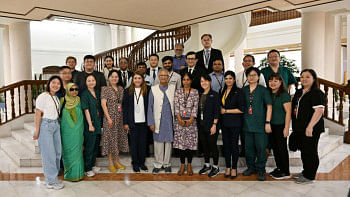26 more Biranganas to be recognised as FFs
Momena Khatun was 17 when the Pakistan army kidnapped her from her house in Bag Achra village of Jessore during the Liberation War.
She was confined in a camp there and raped by the Pakistan army men and their local collaborators until the war ended. When she was released, though her husband accepted her -- unlike most other victims of such brutalities -- he never treated her well.
The society would frown upon her and the state would turn a blind eye to her.
Fate took an even worse turn three months ago when her husband left her fearing she would claim her share in his property. The husband now lives with his other wife.
Momena, now 62, works as a domestic help to earn a living.
"Humiliation, insult and hatred is all I got throughout my life. State recognition? Never happened," she said.
Safura Khatun of Garanbaria village under Debhata upazila in Satkhira suffered likewise at the hands of the Pakistani occupation forces in 1971.
She was pregnant when the Pakistan army men picked her up and took her to their camp.
When she was released after Pakistan surrendered, she already had given birth to a daughter. But her husband took no time to divorce Safura. Begging became her only source of livelihood.
Momena and Safura are among the 26 rape victims of 1971 who are soon going to be recognised as freedom fighters.
The Liberation War Affairs Ministry would in a day or two publish a gazette recognising these 26 Biranganas (war heroines), ministry sources told The Daily Star yesterday.
Once recognised, the Biranganas will receive the same benefits as the freedom fighters' -- a monthly allowance of Tk 8,000 and special quotas in the government jobs and many more benefits for their children and grandchildren.
"I am happy to hear the news. If I get the recognition, it will save me from further humiliation," Momena said last night.
"The stigma of the war not only affected me, it ruined the lives of my two daughters as well. I did not find good husbands for them. I had two marry them to men who do not even have their own place to stay," she added.
Mofazzal Hossain, a freedom fighter himself, is a cousin of Birangana Safura, aged around 60.
"We sought help from the government for Safura quite a few times but nothing happened. If she receives any help now, she will be able to live a better life at least before her death," he told The Daily Star.
On October 12, the government for the first time recognised 41 Biranganas as freedom fighters.
Initially, the government plans to recognise 81 Biranganas listed in the records of the Liberation War Museum. More war heroines would be given the recognition in phases.
Over 200 applications from the Biranganas are now under scrutiny of Jatiya Muktijoddha Council, the central platform of the freedom fighters.
At least 1.62 lakh women were raped, and another 1.31 lakh Hindu women went missing during the Liberation War, according to the War Crimes Facts and Findings Committee led by Dr M Hassan. The Hindu women were believed to have been raped and killed in the Pakistan army camps.
The process of recognising the Biranganas as freedom fighters started following a High Court order on January 27, 2014.
It asked the government to explain why it should not be directed to upgrade the social status of the war heroines and to provide them with state honour and facilities like those of the freedom fighters.
Apart from Momena and Safura, the other 24 war heroines to get the freedom fighter status in the second phase are Rahima Khatun of Sharsha in Jessore; Nigar Sultana of Lohagora in Narail; Anowara Khatun of Fakirhat in Bagerhat; Masuda Khatun of Kumarkhali in Kushtia; Sitara Begum of Barguna; Asia Khatun and Mosammot Sona of Debhata in Satkhira; Kohinur Begum of Uzirpur in Barisal; Bela Rani Das of Muradnagar in Comilla; Joshna Begum, Laily Begum and Namita Rani Das of Fenchuganj in Sylhet; Riva Begum of Gopalganj; Ayesha Khatun, Sarfuli Begum and Bibi Hawa of Jhinaigati in Sherpur; Jobeda Bewa, Hasena Banu, Asiron Bewa and another Jobeda Bewa of Nalitabari in Sherpur; Amena Begum, Feroza Begum and Sheikh Fatema Ali of Savar in Dhaka; and Rajkumari Robidas Fulmoti of Sadullapur in Gaibandha.

 For all latest news, follow The Daily Star's Google News channel.
For all latest news, follow The Daily Star's Google News channel. 



Comments